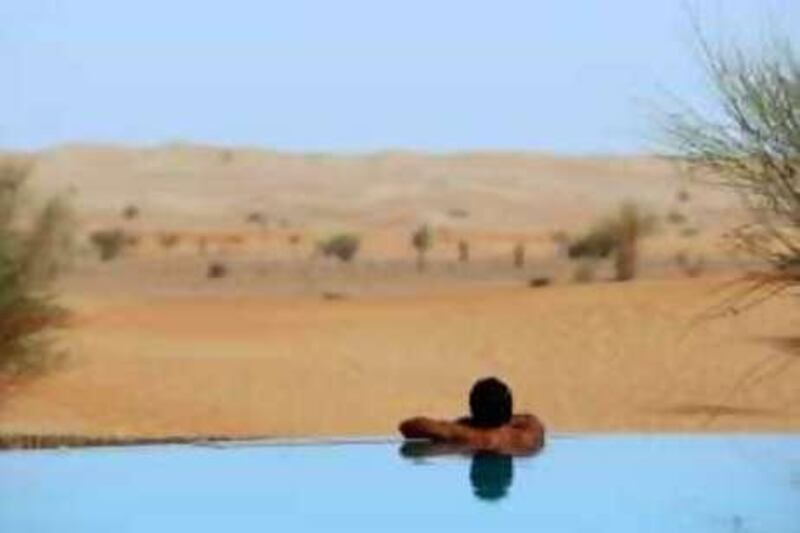Andrew Slyper, a British tourist, was planning his first trip to Dubai earlier this year and decided to pamper himself by booking a boutique hotel for his week-long stay. The media consultant, 35, was seeking a more personal service and did not want to settle for chain hotels, which dominate the country's hospitality sector. "The big hotel chains are fine," said Mr Slyper. "But I was looking for a place with a more homey feel and personalised service. It was a bit challenging and, in the end, I just decided to settle for a chain."
When Mr Slyper arrived in Dubai in June to visit friends, he headed for the four-star, 412-room Hotel Novotel World Trade Centre - a far cry from his original idea on where he wanted to stay on his holiday. "I did enjoy my stay in Dubai, but I would have preferred it if I could have stayed at a boutique hotel," he said. "I enjoy having personalised service, and having less people [staying at] the property is also relaxing."
If you are looking to stay at a hotel with gold-plated bath tubs, life-size horse statues and Kashmir rugs, you will be spoiled for choice in the UAE, land of all things shiny and big. But amid all the razzle and dazzle, some hotels are determined to introduce the concept of boutique hotels to the region. Glitzy four-star and five-star hotels have long dominated the region's hospitality scene, leaving little room for boutique hotels. Today, however, some investors are hoping to cash in on a shift in travellers' needs, in which fewer rooms and a high staff-to-guest ratio can be a more rewarding, relaxing experience.
"A boutique hotel is a hotel that has no more than 100 rooms and has a unique concept or design," said John Podaras, an analyst from TRI, an international hospitality consultancy based in Dubai. "For example, these hotels may have a very homey look and feel. The hotel must also have a high ratio of staff to guests, so personalised details can be taken care of." Boutique hotels took off during the 1980s in major cities such as London and New York. Typically, they are furnished in a themed, chic decor, and preferably by a famous designer. One such designer is the Parisian Philippe Starck, who was at the forefront of the boutique hotel movement with his redesign of New York's Royalton Hotel in the late 1980s.
Up to now, the boutique hotel sector has had difficulty finding a foothold in the UAE. "Investors are less keen on new ideas that have a high level of risk and in terms of business having more rooms means more profit, especially when there is a high demand on hotel rooms," said Mr Podaras. "The boutique hotel sector in the UAE is still very new and requires the market to have a higher level of specialisation than there is right now."
Compared with other countries in the Middle East, including Lebanon and Turkey, where boutique hotels have managed to find their niche, the GCC region still has a long way to go, said Mr Podaras. "Another problem is boutique hotels are traditionally located in vibrant cities, which are an attraction on their own, and the GCC cities still haven't reached that level of attractiveness because of all the construction going on. You can't really have a jewel surrounded by cranes."
The credit crunch will also take a toll on the sector and will lead to such problems as financing projects, construction delays and, ultimately, it will hit tourist numbers. "The Palazzo Versace Resort at Dubai Creek was supposed to open this year but has been delayed," said Mr Podaras. "There is no doubt that the global economic slowdown will impact tourism on the whole and, in particular, the number of leisure travellers - the main target for boutique hotels - will start to drop, making it more of a gamble for an investor to finance such projects."
However, there are a few boutique hotels that have started to appear in Dubai and Abu Dhabi. "Many of the people coming to the UAE are here to see the country's biggest and tallest landmarks, but I think now with the growing trend of boutique hotels people are starting to realise the personal touch that comes with the service," said Axel Jarosch, the general manager of Desert Palm, a 24-room hotel in Dubai operated by Per Aquum Resorts, Spas and Residences.
Late last month, Abu Dhabi opened its first luxury boutique hotel on Sir Bani Yas Island, which once was the private wildlife reserve of Sheikh Zayed bin Sultan, the founder of the nation. Desert Islands Resort and Spa, a 64-room luxury hotel, is located on the northern tip of the island and is managed by Minor Hotels Resorts and Spas, which operates the Anantara Spa at the Emirates Palace. The reason behind opting to open a boutique hotel was to protect the destination, said Andre Erasmus, the general manager of Desert Islands Resort and Spa. "As a destination, Sir Bani Yas Island will never be conducive to large hotels," he said. "Our target market is the discerning, well-educated traveller searching for an authentic holiday experience. This is something that mass tourism can never offer. In this case, bigger is most certainly not better."
Al Maha resort, an upmarket 40-room resort in the Dubai Desert reserve, has been operating since 1999. Owned by Emirates Hotels and Resorts, it is based on successful models in southern and eastern Africa, which use tourism to generate money to support conservation. Tony Williams, the company's senior vice president of resorts and projects, said the resort was not in competition with Desert Islands Resort and Spa. "We are in a completely different league," he said. "The size of the conservation park here is equivalent to the size of Northern Ireland, so we are not just an island with a few animals brought over from around the world." abakr@thenational.ae





